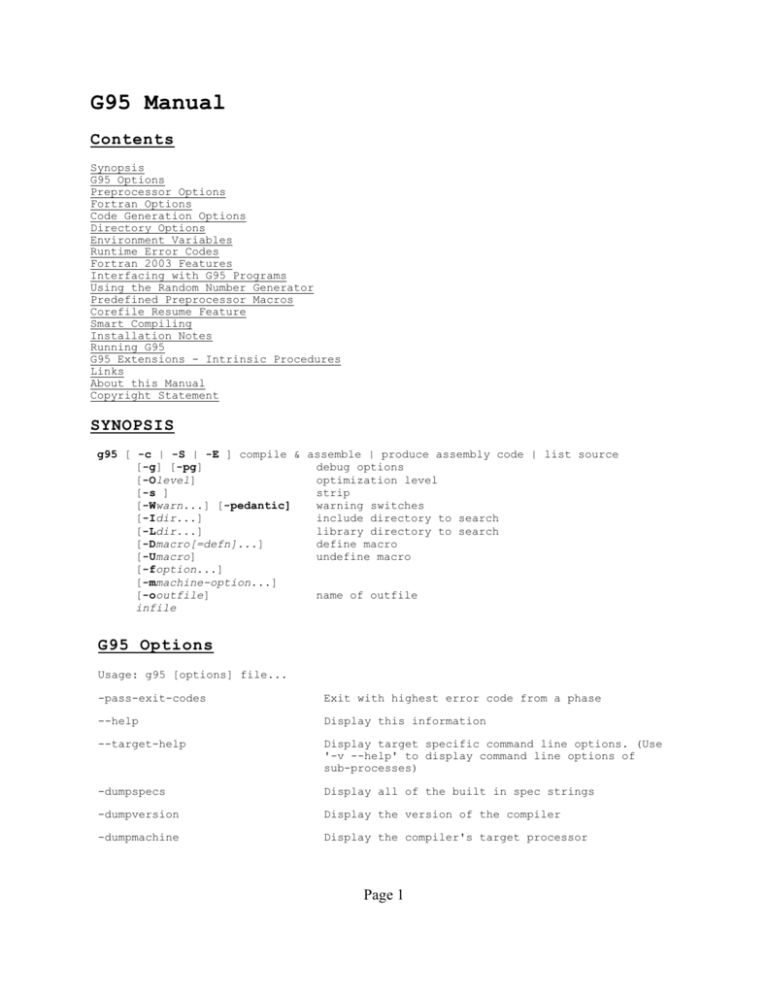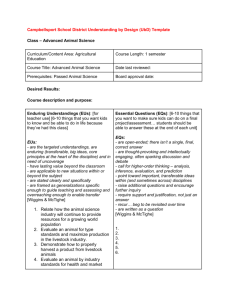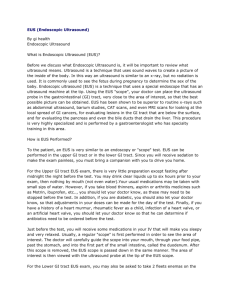G95 Manual
advertisement

G95 Manual Contents Synopsis G95 Options Preprocessor Options Fortran Options Code Generation Options Directory Options Environment Variables Runtime Error Codes Fortran 2003 Features Interfacing with G95 Programs Using the Random Number Generator Predefined Preprocessor Macros Corefile Resume Feature Smart Compiling Installation Notes Running G95 G95 Extensions - Intrinsic Procedures Links About this Manual Copyright Statement SYNOPSIS g95 [ -c | -S | -E ] compile & assemble | produce assembly code | list source [-g] [-pg] debug options [-Olevel] optimization level [-s ] strip [-Wwarn...] [-pedantic] warning switches [-Idir...] include directory to search [-Ldir...] library directory to search [-Dmacro[=defn]...] define macro [-Umacro] undefine macro [-foption...] [-mmachine-option...] [-ooutfile] name of outfile infile G95 Options Usage: g95 [options] file... -pass-exit-codes Exit with highest error code from a phase --help Display this information --target-help Display target specific command line options. (Use '-v --help' to display command line options of sub-processes) -dumpspecs Display all of the built in spec strings -dumpversion Display the version of the compiler -dumpmachine Display the compiler's target processor Page 1 -print-search-dirs Display the directories in the compiler's search path -print-libgcc-file-name Display the name of the compiler's companion library -print-file-name = <lib> Display the full path to library <lib> -print-prog-name = <prog> Display the full path to compiler component <prog> -print-multi-directory Display the root directory for versions of libgcc -print-multi-lib Display the mapping between command line options and multiple library search directories -print-multi-os-directory Display the relative path to OS libraries -Wa, <options> Pass comma-separated options on to the assembler -Wp, <options> Pass comma-separated options on to the preprocessor -Wl, <options> Pass comma-separated options on to the linker -Xassembler <arg> Pass <arg> on to the assembler -Xpreprocessor <arg> Pass <arg> on to the preprocessor -Xlinker <arg> Pass <arg> on to the linker -combine Pass multiple source files to compiler at once -save-temps Do not delete intermediate files -pipe Use pipes rather than intermediate files -time Time the execution of each subprocess -specs = <file> Override built-in specs with the contents of <file> -std = <standard> Assume that the input sources are for <standard> -B <directory> Add <directory> to the compiler's search paths -b <machine> Run gcc for target <machine>, if installed -V <version> Run gcc version number <version>, if installed -v Display the programs invoked by the compiler -### Like -v but options quoted and commands not executed -E Pre-process only; do not compile, assemble or link -S Compile only; do not assemble or link -c Compile and assemble, but do not link -o <file> Place the output into <file> -x <language> Specify the language of the following input files. Permissible languages include: c, c++, assembler, none; 'none' means revert to the default behavior of guessing the language based on the file's extension Page 2 Options starting with -g, -f, -m, -O, -W, or --param are automatically passed on to the various sub-processes invoked by g95. In order to pass other options on to these processes the -W<letter> options must be used. By default, programs compiled with g95 have no optimization. For information on all the GCC options available when compiling with g95, see: http://gcc.gnu.org/onlinedocs/gcc-4.0.1/gcc/. Command line arguments: A program compiled with g95 may be executed with these arguments: -–g95 Display a list of environment variables recognized by g95, runtime error codes, and command line arguments. Preprocessor Options G95 can handle files that contain C preprocessor constructs. -cpp -no-cpp -Dname[=value] -Uname -E -Idirectory Force the input files to be run through the C preprocessor Prevent the input files from being pre-processed Define a preprocessor macro Undefine a preprocessor macro Show pre-processed source only Append 'directory' to the include and module files search path. Files are searched for in various directories in this order: Directory of the main source file, the current directory, directories specified by -I, directories specified in the G95_INCLUDE_PATH environment variable and finally the system directories. Fortran Options -Wall -Werror -Wimplicit-none -Wline-truncation -Wobsolescent -Wno=numbers -Wuninitialized -Wunused-vars -Wunset-vars -Wunused-module-vars -Wunused-module-procs -Wunused-parameter -Wprecision-loss -fbackslash -fd-comment -fdollar-ok -fendian= -ffixed-form -ffixed-line-length-132 -ffixed-line-length-80 -ffree-form -fimplicit-none Enable most warning messages. Change warnings into errors. Same as -fimplicit-none. Warn about truncated source lines. Warn about obsolescent constructs. Disable a comma separated list of warnings indicated by numbers. Warn about variables used before initialized. Requires -O2. Warn about unused variables. Warn about unset variables. Warn about unused module variables. Useful for ONLY clauses. Warn about unused module procedures. Useful for ONLY clauses. Warn about unused parameters. Not implied by -Wall. Warn about precision loss in implicit type conversions. Interpret backslashes in character constants as escape codes. Use -fno-backslash to treat backslashes literally. Make D lines executable statements in fixed form. Allow dollar signs in entity names. Force the endian-ness of unformatted reads and writes. The value must be 'big' or 'little'. Overrides environment variables. Assume that the source file is fixed form. 132 character line width in fixed mode. 80 character line width in fixed mode. Assume that the source file is free form. Specify that no implicit typing is allowed, unless overridden by explicit IMPLICIT statements. Page 3 -fintrinsic-extensions Enable g95-specific intrinsic functions even in a -std= mode. -fintrinsic-extensions=proc1,proc2,... Include selected intrinsic functions even in a -std= mode. The list is comma-separated and case insensitive. -fmod=directory Put module files in directory. -fmodule-private Set default accessibility of module-entities to PRIVATE. -fmultiple-save Allow the SAVE attribute to be specified multiple times. -fone-error Force compilation to stop after the first error. -ftr15581 Enable the TR15581 allocatable array extensions even in -std=F or -std=f95 modes. -M Produce a Makefile dependency line on standard output. -std=F Warn about non-F features. -std=f2003 Strict Fortran 2003 checking. -std=f95 Strict Fortran 95 checking. -i4 Set kinds of integers without specification to kind=4 (32 bits). -i8 Set kinds of integers without specification to kind=8 (64 bits). -r8 Set kinds of reals without kind specifications to double precision. -d8 Implies -i8 and -r8. Code Generation Options -fbounds-check -fcase-upper -fleading-underscore -fonetrip -fpack-derived -fqkind=n -fsecond-underscore -fshort-circuit -fsloppy-char -fstatic -ftrace -funderscoring -max-frame-size=n -finteger=n -flogical= -freal= -fpointer= -fround= -fzero Check array and substring bounds at runtime. Make all public symbols uppercase. Add a leading underscore to public names. Execute DO-loops at least once. (Buggy fortran 66). Try to layout derived types as compact as possible. Requires less memory, but may be slower. Set the kind for a real with the 'q' exponent to n. Append a second trailing underscore in names having an underscore (default). Use -fno-second-underscore to suppress. Cause the .AND. and .OR. operators to not compute the second operand if the value of the expression is known from the first operand. Suppress errors when writing non-character data to character descriptors. Put local variables in static memory where possible. This is not the same as linking things statically (-static). '-ftrace=frame' will insert code to allow stack tracebacks on abnormal end of program. This will slow down your program. '-ftrace=full' additionally allows finding the line number of arithmetic exceptions (slower). Default is '-ftrace=none'. Append a trailing underscore in global names (default). Use -fno-underscoring to suppress. How large a single stack frame will get before arrays are allocated dynamically. Initialize uninitialized scalar integer variables to n. Initialize uninitialized scalar logical variables. Legal values are none, true and false. Initialize uninitialized scalar real and complex variables. Legal values are none, zero, nan, inf, +inf and -inf. Initialize scalar pointers. Legal values are none, null and invalid. Controls compile-time rounding. Legal values are nearest, plus, minus and zero. Default is round to nearest, plus is round to plus infinity, minus is minus infinity, zero is towards zero. Initialize numeric types to zero, logical values to false and pointers to null. The other initialization options Page 4 override this one. Directory Options -I<directory> -L<directory> -fmod=<directory> -frelative Append directory to the include and module files search path Append directory to the library search path Put module files in directory Search relative to the source file directory Environment Variables The g95 runtime environment provides many options for tweaking the behavior of your program once it runs. These are controllable through environment variables. Running a g95-compiled program with the --help option will dump all of these options to standard output. The values of the various variables are always strings, but the strings can be interpreted as integers or boolean truth values. Only the first character of a boolean is examined and must be 't', 'f', 'y', 'n', '1' or '0' (uppercase OK too). If a value is bad, no error is issued and the default is used. For GCC environment variables used by g95, such as LIBRARY_PATH, see the GCC documentation. G95_STDIN_UNIT Integer G95_STDOUT_UNIT Integer G95_STDERR_UNIT Integer G95_USE_STDERR Boolean G95_ENDIAN String G95_CR Boolean G95_IGNORE_ENDFILE Boolean G95_TMPDIR String G95_UNBUFFERED_ALL Boolean G95_SHOW_LOCUS Boolean G95_CHECKPOINT Integer G95_OPTIONAL_PLUS Boolean G95_DEFAULT_RECL Integer G95_LIST_SEPARATOR String G95_LIST_EXP Integer Unit number that will be pre-connected to standard input. No pre-connection if negative, default is 5. Unit number that will be pre-connected to standard output. No pre-connection if negative, default is 6. Unit number that will be pre-connected to standard error. No pre-connection if negative, default is 0. Sends library output to standard error instead of standard output. Default is Yes. Endian format to use for I/O of unformatted data. Values are BIG, LITTLE or NATIVE. Default is NATIVE. Output carriage returns for formatted sequential records. Default true on windows, false elsewhere. Ignore attempts to read past the ENDFILE record in sequential access mode. Default false. Directory for scratch files. Overrides the TMP environment variable. If TMP is not set /var/tmp is used. No default. If TRUE, all output is unbuffered. This will slow down large writes but can be useful for forcing data to be displayed immediately. Default is False. If TRUE, print filename and line number where runtime errors happen. Default is Yes. On x86 Linux, the number of seconds between checkpoint corefile dumps, with zero meaning no dumps. Print optional plus signs in numbers where permitted. Default FALSE. Default maximum record length for sequential files. Most useful for adjusting line length of pre-connected units. Default is 50000000. Separator to use when writing list output. May contain any number of spaces and at most one comma. Default is a single space. Last power of ten which does not use Page 5 G95_COMMA Boolean G95_EXPAND_UNPRINTABLE Boolean G95_QUIET Boolean G95_SYSTEM_CLOCK Integer G95_SEED_RNG Boolean G95_MINUS_ZERO Boolean G95_ABORT Boolean G95_MEM_INIT String G95_MEM_SEGMENTS Integer G95_MEM_MAXALLOC Boolean G95_MEM_MXFAST Integer G95_MEM_TRIM_THRESHOLD Integer G95_MEM_TOP_PAD Integer G95_SIGHUP String G95_SIGINT String G95_FPU_ROUND String G95_FPU_PRECISION String G95_FPU_DENORMAL Boolean G95_FPU_INVALID Boolean G95_FPU_ZERODIV Boolean G95_FPU_OVERFLOW Boolean G95_FPU_UNDERFLOW Boolean G95_FPU_INEXACT Boolean G95_FPU_EXCEPTIONS Boolean G95_UNIT_x String exponential format for list output. Default 6. Use a comma character as the default decimal point for I/O. Default false. For formatted output, print otherwise unprintable characters with \-sequences. Default No. Suppress bell characters (\a) in formatted output. Default No. Number of ticks per second reported by the SYSTEM_CLOCK() intrinsic in microseconds. Zero disables the clock. Default 100000. If true, seeds the random number generator with a new seed when the program is run. Default false. If true, prints minus zero without a minus sign in formatted (non-list) output, contrary to the standard. Default FALSE. If true, dumps core on abnormal program end. Useful for finding the locus of the problem. Default FALSE. How to initialize allocated memory. Default value is NONE for no initialization (faster), NAN for a Not-a-Number with the mantissa 0x40f95 or a custom hexadecimal value. Maximum number of still-allocated memory segments to display when program ends. 0 means show none, less than 0 means show all. Default 25. If true, shows the maximum number of bytes allocated in user memory during the program run. Default No. Maximum request size for handing requests in from fastbins. Fastbins are quicker but fragment more easily. Default 64 bytes. Amount of top-most memory to keep around until it is returned to the operating system. -1 prevents returning memory to the system. Useful in long-lived programs. Default 262144. Extra space to allocate when getting memory from the OS. Can speed up future requests. Default 0. Whether the program will IGNORE, ABORT or SUSPEND on SIGHUP. Default ABORT. Whether the program will IGNORE or ABORT or SUSPEND on SIGINT. Default ABORT. Set floating point rounding mode. Values are NEAREST, UP, DOWN, ZERO. Default is NEAREST. Precision of intermediate results. Value can be 24, 53 and 64. Default 64. Only available on x86 and IA64 compatibles. Raise a floating point exception when denormal numbers are encountered. Default no. Raise a floating point exception on an invalid operation. Default No. Raise a floating point exception when dividing by zero. Default No. Raise a floating point exception on overflow. Default No. Raise a floating point exception on underflow. Default No. Raise a floating point exception on precision loss. Default No. Whether masked floating point exceptions should be shown after the program ends. Default No. Overrides the default unit name for unit x. Page 6 G95_UNBUFFERED_x Boolean If true, unit x is unbuffered. Runtime Error Codes Running a g95-compiled program with the --help option will dump this list of error codes to standard output. -2 -1 0 200 201 202 203 204 205 206 207 208 209 210 211 212 214 215 216 End of record End of file Successful return Operating system errno codes (1 - 199) Conflicting statement options Bad statement option Missing statement option File already opened in another unit Unattached unit FORMAT error Incorrect ACTION specified Read past ENDFILE record Bad value during read Numeric overflow on read Out of memory Array already allocated Deallocated a bad pointer Corrupt record in unformatted sequential-access file Reading more data than the record size (RECL) Writing more data than the record size (RECL) SEE ALSO: For further information see the following man and info entries: gpl(7), gfdl(7), fsf-funding(7), cpp(1), gcov(1), gcc(1), as(1), ld(1), gdb(1), adb(1), dbx(1), sdb(1) and the Info entries for gcc, cpp, as, ld, binutils and gdb. Fortran 2003 Features G95 implements several features of Fortran 2003. For a discussion of all the new features of Fortran 2003, see: http://www.kcl.ac.uk/kis/support/cit//fortran/john_reid_new_2003.pdf The following intrinsic procedures are available: COMMAND_ARGUMENT_COUNT GET_COMMAND_ARGUMENT GET_COMMAND GET_ENVIRONMENT_VARIABLE Real and double precision DO loop index variables are not implemented in g95. Square brackets [ ... ] may be used as an alternative to (/ ... /) for array constructors and delimiters. TR 15581 - allocatable derived types. Allows the use of the ALLOCATABLE attribute on dummy arguments, function results, and structure components. Stream I/O - F2003 stream access allows a Fortran program to read and write binary files without worrying about record structures. For example: Page 7 character(len=5) :: a open(7, file='output', status='old', access='stream') read(7, pos=5) a close(7) print *, a end Reads five bytes directly from position 5 of the 'output' file. I/O can be formatted or unformatted. The INQUIRE statement has also been enhanced to add a POS= tag which returns the current position of the stream file, for a future READ or WRITE. Note: ACCESS='transparent' is equivalent to access='stream' Clive Page has written some documentation on this feature, available at: http://www.star.le.ac.uk/~cgp/streamIO.html IMPORT - can be used in an interface body to enable access to entities of the host scoping unit. European convention for real numbers - a decimal='comma' tag in open, read and write statements allows replacement of the decimal point in real numbers with a comma. MIN() and MAX() work with character as well as numeric types. A type declaration attribute of VALUE for the dummy argument of a subprogram causes the actual argument to be passed by value. F2003 style structure constructors are supported. F2003 style procedure pointers are supported. F2003's BIND(C) construct is supported, providing easier C interoperability. Interfacing with G95 Programs While g95 produces stand-alone executables, it is occasionally desirable to interface with other programs, usually C. The first difficulty that a multi-language program will face is the names of the public symbols. G95 follows the f2c convention of adding an underscore to public names, or two underscores if the name contains an underscore. The -fno-second-underscore and -fno-underscoring can be useful to force g95 to produce names compatible with your C compiler. Use the 'nm' program to look at the .o files being produce by both compilers. G95 folds public names to lowercase as well, unless -fupper-case is given, in which case everything will be upper case. Module names are represented as module-name_MP_name. After linking, there are two main cases: Fortran calling C subroutines and C calling fortran subroutines. For C calling Fortran subroutines, the Fortran subroutines will often call Fortran library subroutines that expect the heap to be initialized in some way. To force a manual initialization from C, call g95_runtime_start() to initialize the fortran library and g95_runtime_stop() when done. The prototype of g95_runtime_start() is: void g95_runtime_start(int argc, char *argv[]); The library has to be able to process command-line options. If this is awkward to do and your program doesn't have a need for command-line arguments, pass argc=0 and argv=NULL. On OSX/Tiger, include '-lSystemStubs' when using g95 to run the linker and linking objects files compiled by gcc. Page 8 Using the Random Number Generator REAL, INTENT(OUT) :: h CALL random_number(h) Returns a REAL scalar or an array of REAL random numbers in h, 0 <= h <1. random_seed CALL random_seed(sz,pt,gt) INTEGER, OPTIONAL, INTENT(OUT) :: sz INTEGER, OPTIONAL, INTENT(IN) :: pt(n1) INTEGER, OPTIONAL, INTENT(OUT) :: gt(n2) Argument ‘sz’ is the minimum number of integers required to hold the value of the seed; g95 returns 4. Argument ‘pt’ is an array of default integers with size n1 >= sz, containing user provided seed values. Argument ‘gt’ is an array of default integers with size n2 >= sz, containing the current seed. Predefined Preprocessor Macros The macros that are always defined are: __G95__ 0 __G95_MINOR__ 50 __FORTRAN__ 95 __GNUC__ 4 The conditional macros are: unix windows hpux linux solaris irix aix netbsd freebsd openbsd cygwin Corefile Resume Feature On x86 Linux systems, the execution of a g95-compiled program can be suspended and resumed. If you interrupt a program by sending it the QUIT signal, which is usually bound to control-backslash, the program will write an executable file named 'dump' to the current directory. Running this file causes the execution of your program to resume from when the dump was written. Page 9 andy@fulcrum:~/g95/g95 % cat tst.f90 b = 0.0 do i=1, 10 do j=1, 3000000 call random_number(a) a = 2.0*a - 1.0 b = b + sin(sin(sin(a))) enddo print *, i, b enddo end andy@fulcrum:~/g95/g95 % g95 tst.f90 andy@fulcrum:~/g95/g95 % a.out 1 70.01749 2 830.63153 3 987.717 4 316.48703 5 -426.53815 6 25.407673 (control-\ hit) Process dumped 7 -694.2718 8 -425.95465 9 -413.81763 10 -882.66223 andy@fulcrum:~/g95/g95 % ./dump Restarting ............Jumping 7 -694.2718 8 -425.95465 9 -413.81763 10 -882.66223 andy@fulcrum:~/g95/g95 % Any open files must be present and in the same places as in the original process. If you link against other languages, this may not work. While the main use is allowing you to preserve the state of a run across a reboot, other possibilities include pushing a long job through a short queue or moving a running process to another machine. Automatic checkpointing of your program can be done by setting the environment variable G95_CHECKPOINT with the number of seconds to wait between dumps. A value of zero means no dumps. New checkpoint files overwrite old checkpoint files. Smart Compiling G95 is friendly to top-down programming style. In other compilers, modifying a routine in a module may trigger a time-consuming compilation cascade of all the code that uses the module. G95 is intelligent about breaking this cycle if it finds that the module interfaces (or module-level variables) have not changed. Installation Notes Linux: Open a console, and go to the directory in which you want to install g95. To download and install g95, run the following commands: wget -O - http://www.g95.org/g95-x86-linux.tgz | tar xvfz ln -s $PWD/g95-install/bin/i686-pc-linux-gnu-g95 /usr/bin/g95 Page 10 The following files and directories should be present: ./g95-install/ ./g95-install/bin/ ./g95-install/bin/i686-pc-linux-gnu-g95 ./g95-install/lib/gcc-lib/i686-pc-linux-gnu/4.0.1/ ./g95-install/lib/gcc-lib/i686-pc-linux-gnu/4.0.1/f951 ./g95-install/lib/gcc-lib/i686-pc-linux-gnu/4.0.1/crtendS.o ./g95-install/lib/gcc-lib/i686-pc-linux-gnu/4.0.1/crtend.o ./g95-install/lib/gcc-lib/i686-pc-linux-gnu/4.0.1/crtbeginT.o ./g95-install/lib/gcc-lib/i686-pc-linux-gnu/4.0.1/crtbeginS.o ./g95-install/lib/gcc-lib/i686-pc-linux-gnu/4.0.1/crtbegin.o ./g95-install/lib/gcc-lib/i686-pc-linux-gnu/4.0.1/cc1 ./g95-install/lib/gcc-lib/i686-pc-linux-gnu/4.0.1/libf95.a ./g95-install/lib/gcc-lib/i686-pc-linux-gnu/4.0.1/libgcc.a ./g95-install/INSTALL ./g95-install/G95Manual.pdf The file cc1 is a symbolic link to f951 in the same directory. Cygwin: The -mno-cygwin option allows the Cygwin version of g95 to build executables that do not require access to the file cygwin1.dll in order to work, and so can be easily run on other systems. Also the executables are free of restrictions attached to the GNU GPL license. To install a Cygwin version with a working -mno-cygwin option, you will need the mingw libraries installed, available from the Cygwin site: http://cygwin.com. Download the binary from http://www.g95.org/g95-x86-cygwin.tgz to your root Cygwin directory (usually c:\Cygwin); start a Cygwin session, and issue these commands: cd / tar -xvzf g95-x86-cygwin.tgz This installs the g95 executable in the /usr/local/bin directory structure. Caution: Do not use Winzip to extract the files from the tarball or the necessary links may not be properly set up. MinGW: The g95 MinGW-based binary for Windows can provide two types of install. If MinGW is found, it installs into the MinGW file structure, otherwise it installs a complete stand-alone version with the supporting MinGW binutils files. Download g95 from http://www.g95.org/g95-MinGW.exe. If you have MinGW, install g95 by executing the installer in the root MinGW directory. Set the PATH to find the MinGW\bin (or the g95\bin) directory, and set the environment variable LIBRARY_PATH with: SET LIBRARY_PATH = <path-to-MinGW/lib>. Windows XP Users Note: MinGW currently allows about 8 mb for the heap on Windows XP. If your application requires access to more memory, try compiling with: -Wl,--heap=0x01000000 Running G95 This section is provided to aid users unfamiliar with Unix compiler syntax. Basic options: -c -o Compile only, do not run the linker. Specify the name of the output file, either an object file or the executable. Multiple source and object files can be specified at once. Fortran files are indicated by names ending in ".f", ".F", ".for", ".FOR", ".f90", ".F90", ".f95", ".F95", and ".f03" and ".F03" for F2003 files. Multiple source files can be specified. Object files can be specified as well and will be linked to form an executable. Page 11 Files ending in uppercase letters are pre-processed with the C preprocessor by default, files ending in lowercase letters are not pre-processed by default. Files ending in ".f", ".F", ".for", and ".FOR" are assumed to be fixed form source compatible with old f77 files. Files ending in ".f90", ".F90", ".f95", ".F95", ".f03" and ".F03" are assumed to be free source form. Simple examples: g95 -c hello.f90 Compiles hello.f90 to an object file named hello.o. g95 hello.f90 Compiles hello.f90 and links it to produce an executable a.out (on Linux), or, a.exe (on MS Windows systems). g95 -c h1.f90 h2.f90 h3.f90 Compiles multiple source files. If all goes well, object files h1.o, h2.o and h3.o are created. g95 -o hello h1.f90 h2.f90 h3.f90 Compiles multiple source files and links them together to an executable file named 'hello', or 'hello.exe' on MS Windows systems. G95 Extensions - Intrinsic Procedures abort access algama besj0 besj1 besjn besy0 besy1 besyn chdir chmod command_argument_count dbesj0 dbesj1 dbesjn dbesy0 dbesy1 dbesyn dcmplx derf derfc dfloat dreal dtime erf erfc etime exit fdate float flush fstat ftell g95_runtime_start gamma get_command get_command_argument get_environment_variable getarg getcwd getenv getlog getpid hostnm isatty isnan lnblnk lstat new_line rand rename secnds signal sizeof sleep srand stat system time unlink %val & %ref abort CALL abort() | INTEGER FUNCTION abort() Prints a message and quits the program with a core dump. access INTEGER FUNCTION access(filename, mode) CHARACTER(LEN=*) :: filename CHARACTER(LEN=*) :: mode Checks whether the file ‘filename’ can be accessed with the specified mode, where ‘mode’ is one or more of the letters ‘rwx’. algama REAL FUNCTION algama(x) REAL, INTENT(IN) :: x Returns the natural logarithm of gamma(x). Page 12 besj0 REAL FUNCTION besj0(x) REAL :: x Returns double-precision bessel function value (first kind, zero order). besj1 REAL FUNCTION besj1(x) REAL :: x Returns double-precision bessel function value (first kind, first order). besjn REAL FUNCTION besjn(n,x) INTEGER :: n REAL :: x Returns double-precision bessel function value (first kind, nth order). besy0 REAL FUNCTION besy0(x) REAL :: x Returns double-precision bessel function value (second kind, zero order). besy1 REAL FUNCTION besy1(x) REAL :: x Returns double-precision bessel function value (second kind, first order). besyn REAL FUNCTION besyn(n,x) INTEGER :: n REAL :: x Returns double-precision bessel function value (second kind, nth order). chdir CALL chdir(dir) | INTEGER FUNCTION chdir(dir) CHARACTER(LEN=*) :: dir Sets the current working directory to 'dir'. chmod INTEGER FUNCTION chmod(file,mode) CHARACTER(LEN=*) :: file INTEGER :: mode Change permissions for a file. command_argument_count INTEGER FUNCTION command_argument_count Returns the number of arguments on the command line. dbesj0 REAL FUNCTION dbesj0(x) REAL :: x Returns a double-precision bessel function value (first kind, zero order). dbesj1 REAL FUNCTION dbesj1(x) REAL :: x Returns a double-precision bessel function value (first kind, first order). dbesjn REAL FUNCTION dbesjn(n,x) INTEGER :: n REAL :: x Returns a double-precision bessel function value (first kind, nth order). Page 13 dbesy0 REAL FUNCTION dbesy0(x) REAL :: x Returns a double-precision bessel function value (second kind, zero order). dbesy1 REAL FUNCTION dbesy1(x) REAL :: x Returns a double-precision bessel function value (second kind, first order). dbesyn REAL FUNCTION dbesyn(n,x) INTEGER :: n REAL :: x Returns a double-precision bessel function value (second kind, nth order). dcmplx() Double precision CMPLX() derf REAL FUNCTION derf(x) REAL :: x Returns the error function of x. derfc REAL FUNCTION derfc(x) REAL :: x Returns the complementary error function of x: derfc(x) = 1 - derf(x). dfloat() Double precision REAL() dreal() Alias for DBLE() dtime CALL dtime(tarray,result) | REAL FUNCTION dtime(tarray) REAL, OPTIONAL, INTENT(OUT) :: tarray(2) REAL, OPTIONAL, INTENT(OUT) :: result Returns the runtime in seconds since the start of the process, or since the last invocation. erf REAL FUNCTION erf(x) REAL :: x Returns the error function of x. erfc REAL FUNCTION erfc(x) REAL :: x Returns the complementary error function of x: erfc(x) = 1 - erf(x). etime CALL etime(tarray,result) | REAL, OPTIONAL, INTENT(OUT) REAL, OPTIONAL, INTENT(OUT) Returns in seconds the time REAL FUNCTION etime(tarray) :: tarray(2) :: result since the start of the process' execution. exit CALL exit(code) INTEGER, OPTIONAL :: code Exit a program with status 'code' after closing open Fortran i/o units. Page 14 fdate CALL fdate(date) | CHARACTER FUNCTION fdate() CHARACTER(LEN=*) :: date Returns the current date and time as: Day Mon dd hh:mm:ss yyyy flush CALL flush(unit) INTEGER :: unit Flushes the Fortran file ‘unit’ currently open for output. fnum INTEGER FUNCTION fnum(unit) INTEGER, INTENT(IN) :: unit Returns the file descriptor number corresponding to ‘unit’. (Unix) fstat CALL fstat(unit,sarray,status) | INTEGER FUNCTION fstat(file,sarray) INTEGER :: unit INTEGER, INTENT(OUT) :: sarray(13) INTEGER, INTENT(OUT) :: status Obtains data about the file open on Fortran I/O unit 'unit' and places them in the array 'sarray'. The values in this array are extracted from the stat structure as returned by fstat(2) q.v., as follows: 1. 2. 3. 4. 5. 6. 7. 8. 9. 10. 11. 12. 13. File mode Inode number ID of device containing directory entry for file Device id (if relevant) Number of links Owner's uid Owner's gid File size (bytes) Last access time Last modification time Last file status change time Preferred i/o block size Number of blocks allocated ftell INTEGER FUNCTION ftell(unit) INTEGER, INTENT(IN) :: unit Returns the current offset of Fortran file ‘unit' (or -1 if 'unit' is not open). g95_runtime_start void g95_runtime_start(int argc, char *argv[]) Force an initialization of the g95 runtime library from C. This may be required in C programs calling Fortran routines, and linked using g95. Use before calling Fortran routines. Call g95_runtime_stop() when done. More information available here. gamma REAL FUNCTION gamma(x) REAL, INTENT(IN) :: x Returns an approximation for gamma(x). getarg CALL getarg(pos, value) INTEGER :: pos CHARACTER(LEN=*), INTENT(OUT) :: value Sets 'value' to the pos-th command-line argument. Page 15 get_command CALL get_command(command,length,status) CHARACTER(LEN=*) :: command INTEGER, OPTIONAL :: length INTEGER, OPTIONAL :: status Returns the command that invoked the program. get_command_argument CALL get_command_argument(number,value,length,status) INTEGER :: number CHARACTER(LEN=*) :: value INTEGER, OPTIONAL, INTENT(OUT) :: length INTEGER, OPTIONAL, INTENT(OUT) :: status Returns the command line argument ‘number’ in ‘value’. getcwd INTEGER FUNCTION getcwd(name) CHARACTER(LEN=*) :: name Returns the current working directory in ‘name’. getenv CALL getenv(variable,value) CHARACTER(LEN=*) :: variable CHARACTER(LEN=*), INTENT(OUT) :: value Returns the value of the environment variable in ‘value’. get_environment_variable CALL get_environment_variable(name,value,length,status,trim_name) CHARACTER(LEN=*) :: name CHARACTER(LEN=*), OPTIONAL, INTENT(OUT) :: value INTEGER, OPTIONAL, INTENT(OUT) :: length INTEGER, OPTIONAL, INTENT(OUT) :: status LOGICAL, OPTIONAL :: trim_name Returns the value of the environment variable ‘name’ in ‘value’, its length in ‘length’, and sets ‘status’ = 0 if successful. If ‘trim_name’ is .true., trailing blanks are trimmed. getlog CALL getlog(name) CHARACTER(LEN=*), INTENT(OUT) :: name Returns the login name for the process in ‘name’. getgid INTEGER FUNCTION getgid() Returns the group id for the current process. getpid() INTEGER FUNCTION getpid() Returns the process id for the current process. getuid INTEGER FUNCTION getuid() Returns the user's id. hostnm INTEGER FUNCTION hostnm(name) CHARACTER(LEN=*) :: name Fills 'name' with the system's host name. iargc INTEGER FUNCTION iargc() Returns the number of command-line arguments (not including the program name itself). Page 16 isatty LOGICAL FUNCTION isatty(unit) INTEGER, INTENT(IN) :: unit Returns .true. if and only if the Fortran I/O unit specified by ‘unit’ is connected to a terminal device. isnan LOGICAL FUNCTION isnan(x) REAL :: x Tests whether ‘x’ is Not-a-Number (NaN). link INTEGER FUNCTION link(path1,path2) CHARACTER(LEN=*), INTENT (IN) :: path1 CHARACTER(LEN=*), INTENT (IN) :: path2 Makes a (hard) link from file ‘path1' to ‘path2'. lnblnk INTEGER FUNCTION lnblnk(string) CHARACTER(LEN=*), INTENT (IN) :: string Alias for len_trim; returns the index of the last non-blank character in ‘string’. lstat CALL lstat(file,sarray,status) | INTEGER FUNCTION stat(file,sarray) CHARACTER(LEN=*) :: file INTEGER, DIMENSION(13), INTENT(OUT) :: sarray INTEGER, INTENT(OUT) :: status If 'file' is a symbolic link it returns data on the link itself. See Fstat() for further details. new_line CHARACTER FUNCTION new_line(a) CHARACTER :: a Returns a new line character, achar(10) rand REAL FUNCTION rand(x) INTEGER, OPTIONAL :: x Returns a uniform quasi-random number between 0 and 1. If x is 0, the next number in sequence is returned; if x is 1, the generator is restarted by calling ‘srand(0)’; if x has any other value, it is used as a new seed with srand. rename CALL rename(path1, path2, status) CHARACTER(LEN=*) :: path1 CHARACTER(LEN=*), INTENT(OUT) :: path2 INTEGER, OPTIONAL, INTENT(OUT) :: status Renames the file ‘path1' to ‘path2'. If the ‘status’ argument is supplied, it contains 0 on success or an error code otherwise upon return. secnds INTEGER FUNCTION secnds(t) REAL, INTENT(IN) :: t Returns the local time in seconds since midnight minus the value t. signal CALL signal(signal,handler,status) | INTEGER FUNCTION (signal,handler) INTEGER :: signal PROCEDURE :: handler INTEGER :: status Calls the unix ‘signal’ routine. Page 17 sizeof INTEGER FUNCTION sizeof(object) The argument ‘object’ is the name of an expression or type. Returns the size of ‘object’ in bytes. sleep CALL sleep(seconds) INTEGER :: seconds Causes the process to pause for ‘seconds’ seconds. srand CALL srand(seed) INTEGER :: seed Re-initializes the random number generator with the seed in 'seed'. stat CALL stat(file,sarray,status) | INTEGER FUNCTION stat(file,sarray) CHARACTER(LEN=*) :: file INTEGER, INTENT(OUT) :: sarray(13) INTEGER, INTENT(OUT) :: status Obtains data about the given file and places it in the array ‘sarray’. See Fstat() system CALL system(cmd,result) | INTEGER FUNCTION system(cmd) CHARACTER(LEN=*) :: cmd INTEGER, OPTIONAL :: result Passes the command ‘cmd’ to a shell. time INTEGER FUNCTION time() Returns the current time encoded as an integer in the manner of the UNIX function 'time'. unlink CALL unlink(file,status) | INTEGER FUNCTION unlink(file) CHARACTER(LEN=*) :: file INTEGER, INTENT(OUT) :: status Unlink the file 'file'. (Unix) %val() and %ref() Allow Fortran procedures to call C functions. Links The g95 home page: Documentation: Fortran 2003: This manual: Cool Features: Compiling g95: Source code: Support newsgroup: Bug reports: Authors: See the file http://www.g95.org http://www.g95.org/docs.html http://j3-fortran.org/doc/standing/2003/007.pdf http://www.g95.org/G95Manual.pdf http://www.g95.org/cool.html http://www.g95.org/src.html http://ftp.g95.org/g95_source.tgz http://groups.google.com/group/gg95/ andyv@firstinter.net. AUTHORS for a list of contributors to g95. About this Manual This manual is maintained by Douglas Cox; please report any errors or omissions to: tcc@sentex.net. While most g95 extensions and g95-specific compiler options are listed here, this version of the manual is not intended to be a Fortran 95 language reference. Documentation for Fortran 95 and programming tutorials can be easily found on the Web. See the GCC documentation for additional compiler and linker options, and optimization options appropriate for your system. Page 18 G95 is still being developed, so discrepancies between the manual and the latest version of the compiler may sometimes occur. The documentation at http://www.g95.org/docs.html is generally more current. This manual was updated 6 March, 2006. Copyright Statement Copyright © 2006 by the Free Software Foundation. Permission is granted to copy, distribute and/or modify this document under the terms of the GNU Free Documentation License, Version 1.2 or any later version published by the Free Software Foundation; with no Invariant Sections, no Front-Cover Texts, and no Back-Cover Texts. A copy of the GNU Free Documentation License is provided at: http://www.gnu.org/licenses/fdl.txt. Page 19




